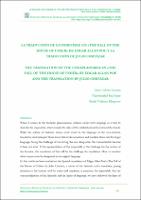Por favor, use este identificador para citar o enlazar este ítem:
https://repositorio.usj.es/handle/123456789/779
Registro completo de metadatos
| Campo DC | Valor | Lengua/Idioma |
|---|---|---|
| dc.contributor.author | Achón Lezaun, Irene | - |
| dc.contributor.author | Valiente Mingotes, Sheila | - |
| dc.date.accessioned | 2022-05-12T07:56:06Z | - |
| dc.date.available | 2022-05-12T07:56:06Z | - |
| dc.date.issued | 2021-12-28 | - |
| dc.identifier.citation | Achón Lezaun, I., & Valiente Mingotes, S. (2021). La traducción de lo indecible en «The Fall of the House of Usher» de Edgar Allan Poe y la traducción de Julio Cortázar . ACTIO NOVA: Revista De Teoría De La Literatura Y Literatura Comparada, (Monográfico 5), 26–55. https://doi.org/10.15366/actionova2021.m5.002 | es_ES |
| dc.identifier.issn | 2530-4437 | es_ES |
| dc.identifier.uri | https://repositorio.usj.es/handle/123456789/779 | - |
| dc.description | \'v'hen it comes to the fantastic phenomenon, authors «only» have language as a tool to describe the impossible, which breaks the rules of the established and lies behind the words. \Vhile the author of fantastic stories must resort to the language of the non-existent, translators must interpret those terms that evoke sensations and translate them into the target language, facing the challenge of translating the non-designable, the untranslatable because it <loes not exist. If the representation of the impossible is the chaUenge for the writers of the fantastic, the translation of that will be the challenge for translators: How to translate what cannot even be designated in its original language. In this article we have worked on the Spanish translation of Edgar Allan Poe's «TI1e FaU of the House of Ushern by Julio Cortázar, a writer of the fantastic and a translator, pa1ing attention to the lexicon used by writer and translator to represent the impossible. For the contextualization of the fantastic and the limits of language, we have followed the lines of David Roas, mainly, and other authors, such as Bozzetto, who have studied the rhetoric of the fantastic. | es_ES |
| dc.description.abstract | Cuando hablamos del fenómeno fantástico, los autores «solo» tienen el lenguaje como herramienta para describir lo imposible, lo que rompe con las reglas de lo establecido y subyace tras las palabras. Mientras el autor de relatos fantásticos debe recurrir al lenguaje de lo no existente, los traductores deben interpretar esos términos que evocan sensaciones y trasladarlos a la lengua meta, enfrentándose al reto de traducir lo indesignable, lo intraducible por no existente. Si la representación de lo imposible es el reto de los escritores de lo fantástico, la traducción de aquello será el reto de los traductores: Cómo traducir lo que no se puede ni designar en su lengua original. En este artículo se ha trabajado la traducción de «The Fall of the House of Usher» de Edgar Allan Poe hecha por Julio Cortázar, escritor de lo fantástico además de traductor, prestando atención al léxico utilizado por escritor y traductor para representar lo imposible. Para la contextualización de lo fantástico y los límites del lenguaje se han seguido las líneas de David Roas, principalmente, y de otros autores, como Bozzetto, que han estudiado la retórica de lo fantástico. | es_ES |
| dc.format.extent | 30 p. | es_ES |
| dc.format.mimetype | application/pdf | es_ES |
| dc.language.iso | spa | es_ES |
| dc.publisher | Universidad Autónoma de Madrid Ediciones | es_ES |
| dc.rights | Atribución-NoComercial 4.0 Internacional | * |
| dc.rights.uri | http://creativecommons.org/licenses/by-nc/4.0/ | * |
| dc.subject | Traducción literaria | es_ES |
| dc.subject | Fantástico | es_ES |
| dc.subject | Retórica de lo indecible | es_ES |
| dc.subject | Julio Cortázar | es_ES |
| dc.subject | Edgar Allan Poe | es_ES |
| dc.subject | Intraducible | es_ES |
| dc.subject | Literary translation | es_ES |
| dc.subject | The fantastic | es_ES |
| dc.subject | Rhetoric of the unspeakable | es_ES |
| dc.subject | Untranslatable | es_ES |
| dc.title | La traducción de lo indecible en «The Fall of the House of Usher» de Edgar Allan Poe y la traducción de Julio Cortázar | es_ES |
| dc.type | journal article | es_ES |
| dc.identifier.publicationfirstpage | 26 | es_ES |
| dc.identifier.publicationlastpage | 55 | es_ES |
| dc.identifier.doi | https://doi.org/10.15366/actionova2021.m5.002 | es_ES |
| dc.rights.accessRights | open access | es_ES |
| Aparece en las colecciones: | Artículos de revistas | |
Ficheros en este ítem:
| Fichero | Descripción | Tamaño | Formato | |
|---|---|---|---|---|
| La traducción de lo indecible.pdf | 4,43 MB | Adobe PDF |  Visualizar/Abrir |
Este ítem está sujeto a una licencia Creative Commons Licencia Creative Commons

